Kategorie: ‘Italy’
My Internship at a Geotourism Company on the Island of Ischia
- Applied Geography B.Sc.
- Italy, Ischia
- Eurogeopark
- 04/2025 – 06/2025
Application / Search for an Internship
In February, I was faced with the task of finding an internship for my bachelor’s degree. I wanted to do something exciting and varied – preferably nothing that took place solely in an office. So I searched the internet and came across an advertisement for a ‘GEO internship on the island of Ischia’ from the company Eurogeopark. My interest was immediately piqued: a green island in the Mediterranean, just off the coast of Naples, geological hiking tours on volcanic, geological and botanical topics – and all of this for three months in Italy. I was immediately convinced. I applied directly via the email address provided with the required documents and received confirmation of the internship starting on 1 April on the same day. However, before I could get started, I had a few things to organize: the university had to recognize the internship abroad, I applied to Erasmus+ for financial support, looked for accommodation and planned my journey.
In the end, I decided to travel by train. A few days before I was due to start, I packed my things and travelled via Zurich – with an overnight stay – to Naples, from where I took the ferry to my destination island: Ischia.
Accommodation & Living Expenses

Ischia ©Gefion Bardenz
Eurogeopark did not provide me with accommodation, so I initially looked for a flat myself – which proved difficult. Three months is too long for holiday flats, but too short for regular rental contracts. Finally, I turned to my boss, who put me in touch with someone locally. I found a great flat in Ischia Porto, only about a 20-minute walk from the harbor and center of the city.
The flat was large – almost too large for one person – but it was perfect for entertaining guests. It had two bedrooms, a bathroom, a dining/living room, a kitchen, a balcony and was equipped with everything I needed: stove, oven, pots, dishes, washing machine, WiFi, etc. I paid €17 per day, which was quite cheap compared to the offers on the internet. At the end of my stay, I had to pay about €70 for utilities (gas, electricity, etc.).
The location was very convenient: two supermarkets were about ten minutes away, and mini markets for fruit, vegetables and everyday items were also nearby. I received €235 per month from my internship provider as salary and for the bus ticket. I would definitely recommend the monthly ticket (€33.90) – the bus system is well developed and takes you almost everywhere on the island. Alternatively, you can rent a scooter or an (e-)bike, but you should bear in mind the chaotic traffic and narrow streets.
Everyday life/Internship

Monte Epomeo ©Gefion Bardenz
Eurogeopark offers geological and botanical tours in the form of hikes and minibus tours on Ischia. The focus is less on cultural content and more on scientific topics such as volcanism and geology. There were a total of five full-day tours, two short tours and three minibus tours, which were offered daily or weekly. The aim of the internship was for us – three interns – to be able to lead the tours independently. At the beginning, we therefore walked each tour twice together with the employed geologist Yvonne in order to familiarize ourselves with the content, routes and procedures. After that, the three of us led our first tours to gain confidence. We had access to a comprehensive internal file with background information on each tour. From about the third week onwards, a fixed three-week rhythm of home office, short tours and day tours established itself. The tours usually started at 10:00 a.m., and we were supposed to be at the meeting point at around 9:30 a.m. Depending on the tour, the day ended around 3:00 or 4:00 p.m. Afterwards, I took care of organisational tasks from home.
Saturdays were work days – but without guided tours. Instead, we distributed brochures in hotels, restaurants and bars to draw attention to the offer.
Working from home, we took care of social media channels (e.g. Instagram, Facebook, GetYourGuide, TripAdvisor), created posts about events, planned posts and promoted the channels. I also wrote hotel descriptions for tourists. If we didn’t finish everything on Saturday, we distributed more brochures during the week. Depending on what was needed, we also helped maintain the hiking trails – for example, by clearing overgrown paths.
At the end, each of us was given our own topic for a blog post. My topic was mapping the vegetation along the trail, which I did while working from home. This allowed me to significantly expand my botanical knowledge.
Language
It was not necessary to speak Italian for the internship, as the guided tours and internal communication within the company were conducted in German. Even when it came to organizational matters, such as in hotels or with transfer drivers, I usually got by fine with German or English. Nevertheless, it was nice to use simple Italian phrases from time to time in everyday life – especially when making small purchases or in cafés.
Support & Contact Persons
I did not need to seek direct support from Erasmus+ or the university during the internship, as everything worked well in terms of organization. I was also lucky with my accommodation: if there were any minor problems, I could always contact my landlady. She was very friendly and helpful, which made it much easier for me to settle in and get through everyday life on the island.
Free Time/Tips

Castello Aragonese ©Gefion Bardenz
In Italy, a 6-day working week is still common, so I had Sundays off. I usually spent this day with the other two interns exploring the island or the surrounding area. We already knew some a lot places from the guided tours, but on our days off we discovered things like thermal baths with natural thermal water or visited sights such as the Castello Aragonese. A day trip to the neighbouring island of Procida is highly recommended – there you will find classic Italian idyll with colourful houses and narrow streets. For those interested in geology, trips to Pozzuoli (Solfatara) or Vesuvius are worthwhile. Sometimes, however, I simply stayed on Ischia, relaxed on the beach with a book, went swimming or strolled through the narrow streets. A personal highlight was Pelara Bay: secluded, surrounded by volcanic nature and with fantastically clear water – perfect for unwinding.
As I had no direct contact with the university or other student groups, I didn’t meet many new people. I spent most of my time with the two other interns and friends who visited me. The atmosphere at the company was more businesslike than friendly, so I didn’t develop any close relationships outside of work. There were many festivals during my stay. The traditional Easter festival with the ‘angel run’ on Easter Sunday and the colourful broom festival were particularly enjoyable. These events offered a great opportunity to get to know the local culture better.
Conclusion

Pelara Bucht ©Gefion Bardenz
The internship on Ischia was a formative experience abroad that taught me a lot, both professionally and personally. I was able to take on responsibility in many areas, independently led tours, prepared content and learned to react flexibly to new situations. I particularly enjoyed working with the guests. Living abroad also worked out very well for me: I quickly found my feet on Ischia, felt safe and comfortable, and really enjoyed island life with its nature, culture and cuisine. Although I gained valuable insights during my time at Eurogeopark, there were certain structural and interpersonal aspects that raised concerns and somewhat affected my overall impression of the organization. A lot of challenges made it difficult to fully view the company as a reliable internship provider. However, this does not detract from the overall enriching experience of having lived and worked abroad – an opportunity I would definitely seize again.
Writing a master thesis in Italy
- Plastics and Textile Technology M.Sc.
- Italy, Bollate(MI)
- SYENSQO Specialty Polymers Italy S.p.A.
- 10/2023-03/2024
Application/Finding a master thesis
As in most study programs, you can choose to write your thesis at the university or externally in a company. For this reason, it was clear to me at an early stage that I wanted to write my Master’s thesis externally in order to gain further important practical experience. The contact to the former SOLVAY (SOLVAY has outsourced its Specialty Polymer Business Unit and founded its own company, which is now called SYENSQO) was made via the IKV Recruiting Speed Dating. There I was able to get to know my current supervisor in a brief in
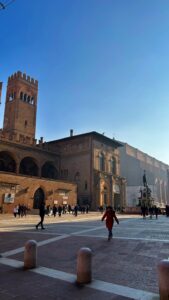
© Cihan Koyuncu
Bologna
terview and discuss my ideas about an external master’s thesis. It was no problem to get a confirmation, as both sides were interested in carrying out a Master’s thesis. As the Bollate site has never had a Master’s student outside of Italy before, in addition to the selection of the topic, a number of things had to be clarified with regard to insurance, contract, payment and other regulations. These points were resolved within almost a year via several meetings with various departments of the company or the university, so that I was able to start in Italy on time on 01.10.2023. For a good planning of a stay abroad, 9-12 months should be taken into account. If you are going to work abroad, you should find out about tax matters in advance. In the case of Italy, a Codice Viscale is required, which you can apply for at any Italian embassy in Germany.
Accommondation & Living expenses
Since I needed a furnished apartment, I used AirBnB to ask the various apartment providers for a long-term contract. This allowed me to reduce the price a little, as I was able to save on Airbnb’s fees and they were able to accommodate me in terms of price due to the 6-month stay. As Italians rarely speak English, there were considerable communication problems with some of the locals. For this reason, communication often took place via Deepl in order to at least get the message across. Financing an apartment in Milan would not have been possible despite the salary and the Erasmus money. That’s why I first lived in Limbiate and later in Magenta. This saved me the high rents in Milan. Nevertheless, I had to spend more on gas and have to travel 30-60 minutes to get to work, depending on the traffic. The remaining costs were comparatively slightly lower than in Germany. Despite this, I was able to travel a lot and generally had a very good time in Italy. Many museums and attractions are free for young adults under 25. Restaurants are comparatively cheaper as German restaurants and the quality of the food is significantly better. I was able to save some money, because the meals at work were free for me.
Everyday life/the internship
I had a 40-hour contract and therefore spent 9 hours a day in Bollate including a break. In the morning I left the house at 8:30 a.m. and was there at around 9:15 a.m. Because the working hours were flexible, I was able to come and go whenever I wanted. The most important thing was that I fulfill my tasks with high quality and at the same time deliver them on time. Due to the early work traffic, I deliberately drove to work later and was therefore able to reduce travel times. Whenever my supervisor worked from home, I was also allowed to work from home. At Syensqo, in addition to my master’s thesis, I took part in regular work operations and was therefore able to help out with some projects on the side. I was able to get to know many colleagues from the site, exchange ideas and work together. Among other things, we had contact with colleagues in Lyon, France and Alpharetta, USA. The lunch break enabled me to get to know my colleagues better.
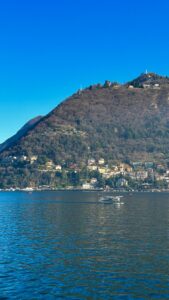
© Cihan Koyuncu
Lake Como
Here in Italy great value is placed on food culture. In the canteen there is a first (primi) and second (secondi) course in addition to salad and dessert every day. After every lunch break we sat down together for an espresso. Afterwards you were fit enough to devote yourself to work again.
The master’s thesis was about the comparison of high-performance tribological plastic compounds with and without PTFE. I examined the tribological parameters (COF, wear, PV limit) of various compounds and compared them with each other. This made it possible to determine the effect of graphite and other tribological additives on the tribological properties. In addition, two different methods for determining the tribological properties were compared.
After work there wasn’t much time left for other activities. I often did sports or studied for upcoming exams in the evenings. I was also allowed to fly back to Germany for the exams and work from my home office for several weeks. I was also able to get to know SYENSQO’s German location in Duesseldorf. What pleasantly surprised me was that even in Germany the colleagues were international. My colleagues were therefore predominantly Italian, but there were also some French, Austrian, Irish, Turkish and German colleagues. The working language was English, which is why my English improved significantly over these six months. But I also had the opportunity to learn some Italian.
It was particularly exciting to find out about everyday matters in Italy, all of which are different in Germany. Shopping, paying tolls or even washing the car was a bit of a challenge at first, but we were quickly able to figure it out with the help of the internet and by asking the locals. Even though many Italians were either unwilling to speak English or simply couldn’t speak it, a lot was communicated via gestures and facial expressions and, if necessary, communicated directly in Italian using Google Translate.
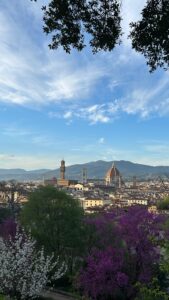
© Cihan Koyuncu
Florence
Free time/tips
During the six months I was there, I wanted to see as much of Italy as possible. That’s why I spent most of my free time at the weekend travelling around the cities. The cultural sights and churches in particular are a definite must-see. The train connections in Italy are very good, much more punctual than in Germany and comparatively cheaper. I often slept in cheap hostels so that I could finance this amount of travelling. You can be lucky, but you can also be unlucky, which is why it’s well worth doing your research beforehand. Most sights in Italy are free for EU citizens under 25. Student discounts are rare, but in the cases where they were offered, I often didn’t have to show anything. Tickets for attractions could often be booked online in advance, which saved precious waiting time. However, you often had to pay by credit card. Here is a list of the cities I visited and my most important tips for a stay there.
Milan
Despite the fact that it is a world metropolis, Milan is actually the city that is least worth seeing in my opinion. This is not because the city itself is not beautiful, but rather because I liked all the other cities much better. The main sights in Milan are the cathedral and the Galleria Vittorio Emanuelle II, both of which are located directly on the cathedral square. You can visit the cathedral and even go up to the roof of the cathedral. Milan’s Arc de Triomphe and the neighbouring park are also very beautiful. If you walk through the park, you quickly come to a former castle, which you can also visit. There are many culinary options in Milan. Above all, a visit to China Town is worthwhile, especially in the evening. You can also visit the Cimitero Monumentale (Milan’s old cemetery) with its incredibly beautiful sculptures and tombs. Important Milanese personalities are also buried there, so it’s worth checking out who is buried there first. You can also visit the original “Last Supper” by Da Vinci in Milan. However, getting tickets for this was much more complicated than usual, which is why I unfortunately missed it.
Como
If you live near Como, I think it’s worth making several trips to Como and especially to enjoy the beautiful view.
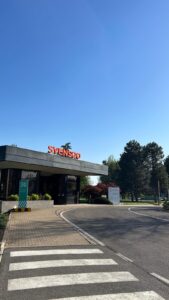
© Cihan Koyuncu
Syensqo
Como is located on Lake Como and from there you can visit the numerous small villages on the lake. It is probably one of the most beautiful places in Italy, especially in summer. In Como, you can also book tickets for a boat tour that will take you to the villages on the lake.
Bergamo
Bergamo is one of the smaller cities in the Milan metropolitan region. Bergamo’s old town is situated on a hill, so you can either climb up the numerous steps or take the mountain railway (€1.70 each way). A beautiful old town centre awaits you at the top. The two churches on the market square are particularly worth a visit. I can particularly recommend foccacia at Il Fornaio and the original and first straciatella ice cream at La Marianna. A short day trip is enough to fully explore Bergamo.
Verona
Verona also has a beautiful old town centre. I was only able to stay there for a few hours on the way back from Venice. I can only encourage everyone to visit this city. Verona is also the city of Romeo and Juliet.
Venice
I don’t think I need to say much about Venice. Beautiful city with numerous canals, but unfortunately with a lot of tourists. Even if you just stroll through the streets of Venice, you can see a lot of beautiful things there. The big sights are definitely the Doge’s Palace and St. Mark’s Basilica. The Venice Opera is definitely worth seeing.
Turin
Very few people have an eye on the city on the Po. Still a very beautiful city that is definitely worth a day trip. The Musei Reali contains some really beautiful art and should definitely be visited. There is also a very nice car museum in Turin for all car enthusiasts. But definitely don’t miss the opportunity to take a walk along the Po.
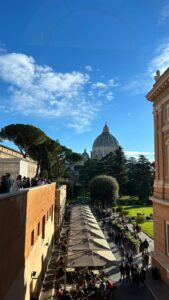
© Cihan Koyuncu
Vatican
Genoa
The largest connected old town in the world can be found in Genoa. I was rather suspicious when I looked at the pictures on the Internet, but I was even more enthusiastic about this city once I was there. Therefore a must for everyone who wants to see a very extravagant, very wealthy city in Italy with a French flair.
Florence
The city of the Medici, an absolute must-see for anyone who has been to Italy. The Galleria dell’Academica and the Uffizi are a must-visit, especially for art enthusiasts. There you can see, among other things, the impressive original David sculpture. The magnificent Duomo in Florence is beautiful from the outside. But save yourself the waiting time and don’t go in, as it’s even bareer inside. For everyone who likes to learn about the history of Italy and Florence. Most and important Medicis, Donatello and 1-2 popes are buried in the Medici Chapel. You can get a good view of the city from one of Florence’s gardens, but you have to pay an entrance fee. Instead you can go to Piazzale Michelangelo and watch the sunset from there. You can get a good view of the city from one of Florence’s gardens, but you have to pay an entrance fee. Instead you can go to Piazzale Michelangelo and watch the sunset from there.
Rome
You should generally plan 3-4 days for Rome because you can see so much. Therefore, you should plan well in advance. The only tip I would like to give about Rome. Be sure to book tickets for the Vatican Museum in advance (1-2 weeks in advance). Otherwise you have to wait in line for up to 3 hours. But it was still worth it because you can see, among other things, the Sistine Chapel and with it the famous chapel painting by Michelangelo (The Creation of Adam).
So as became clear, spending time on weekends, holidays and good planning meant I was able to travel a lot. Even though this meant foregoing most of the other luxuries, I think I made the most of my time in Italy.
Conclusion
I am very satisfied and grateful for the opportunity to have been abroad. This would not have been possible without the support of Erasmus+. Not only was I able to gain important experience but I was also able to grow as a person. Living abroad is an experience that I would recommend to everyone and that will definitely provide personal growth. From today’s perspective I might approach certain points differently, but overall I’m very happy with how these six months went. The six months at SYENSQO also showed me what the working world looks like in other countries and how it can differ from that in Germany. Important experiences that I will carry with me in my life regarding international understanding. I can only recommend that everyone take a stay abroad as part of their studies. Above all, I can recommend everyone to visit this beautiful country, absorb the culture and experience all the beautiful things that I could only touch on here as part of the report.
Clinical rotation in the department of surgery in Bruneck, Italy
- Medicine
- Bruneck, Italy
- Università di Verona
- 03/2023 – 07/2023
1. Application/Finding an internhip
The preparation for my hospital internship in surgery was very smooth. I applied 7 months
before my stay at various hospitals throughout South Tyrol. I was able to find an internship for
the entire 4 months in Bruneck. Although everything worked out well I would recommend
applying earlier to be on the safe side. There was a dedicated contact person, Dr. Neumair, at
the hospital in Bruneck who handled communication with the University of Verona. She
ensured that everything was arranged for my stay. Working with her was extremely helpful and
reassuring, as it allowed me to focus on the professional aspects of my internship without
worrying about organizational matters. The International Office was also very helpful with my
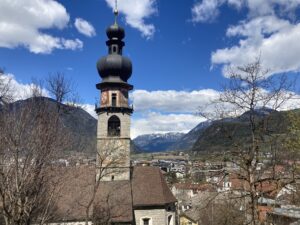
Bruneck
© Felicitas Weiß
Erasmus Plus application, providing clear guidance and prompt communication with the
respective contact persons. Their support made the process stress-free, enabling a rewarding
international academic experience during my hospital internship.
2. Accomodation & Living expenses
After a quick research on the internet (http://accommodationunibz.blogspot.it/) I was able to stay in a 5-person shared
apartment with other students from the University of Bozen. For 520€ per month I got a fully
furnished 17sqm room. The shared apartment had great common areas with a pool table and
Netflix account. There was also a laundry room and a cleaning lady who came every two weeks.
The accommodation was perfect and allowed me to have a pleasant stay during my internship.
There were also some cheaper rooms for subletting, but I preferred to live in a shared apartment
so I could connect with people who live in Bruneck and know the area.
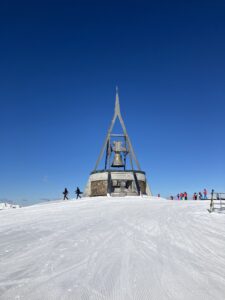
Kronplatz
© Felicitas Weiß
The cost of living in South Tyrol is comparable to Germany. Groceries are a bit more expensive.
However, public transportation is quite cheap and reliable. Most importantly, aperitivos are
cheaper than in Germany and are usually served with a small snack on the side!
3. The internship
My surgery rotation was an enriching and rewarding experience. Working in the general surgery
department provided a wide range of opportunities, from assisting in the operating room to
helping out in the outpatient clinic and the emergency department, known as “pronto soccorso”.
Everyone in the team was genuinely kind and welcoming, always ready to answer questions
and eager to receive assistance.
The hands-on experience was good. I was given the chance to examine patients, perform
ultrasound scans, and even practice suturing. The surgeons made me feel like a valued member
of the team. During quieter times in general surgery, I was encouraged to observe and assist the
orthopedic team.
The hospital staff must speak both Italian and German, so it is easy to communicate with them.
There are only a few patients who speak only Italian or Ladin. In these cases, the nurses
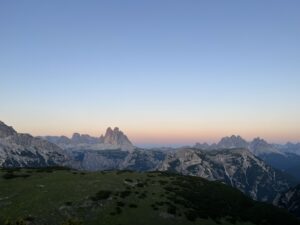
Zinnen-Blick
© Felicitas Weiß
translate, and after a while I picked up the common expressions and was able to use them
myself. If you are not from southern Germany, the South Tyrolean dialect can also be a bit
difficult at first, but you understand it with time.
My day started at 7:45 am and I usually stayed until 2:30 pm. Sometimes I could leave earlier
or had to stay longer to assist in the operating room, depending on what surgeries were coming
up. Besides me, there were five other students in general surgery and trauma surgery, so we set
up a rotation schedule so we didn’t have to come in every day or could leave early. Our schedule
also included weekend duty (on-call shifts). In return, we got two days off during the week.
A definite highlight was the cafeteria’s delicious meals. As students, we enjoyed complimentary
access to a variety of Primi Piatti, Secondi Piatti, a salad buffet, and delicious desserts.
4. Free time/tips
During my free time, I took an Italian language course at a language school to improve my
communication with patients. The course proved to be very helpful during my hospital
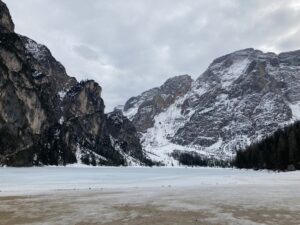
Pragser Wildsee
© Felicitas Weiß
internship and especially my travels afterwards and I would recommend doing one if you have
the chance.
When I arrived in March, the ski season was still in full swing, and with the Kronplatz as the
local mountain in Bruneck, it provided the perfect conditions for skiing. The snow-covered
slopes and breathtaking panorama made for unforgettable ski days. It was an excellent
opportunity to experience the beauty of the South Tyrolean mountains.
Later, I used my free time for extensive hikes to explore the nature of South Tyrol. The
surrounding landscapes offered a variety of hiking trails, lakes and summits. I strongly
recommend doing Piz da Peres and Peitlerkofel as well as a sunrise/sunset hike at Sambock.
In addition to exploring the local region, I embarked on exciting trips to some of Italy’s famous
cities. Venice, with its romantic canals and unique architecture, Verona with its impressive
Colosseum, and the fashion capital Milan were just a few of the captivating destinations. I also
visited Turin, Genova, Meran and the Garda Lake, each providing a different cultural diversity
and an immersive experience in the Italian way of life. It’s easy to reach those cities by train
and if you book in advance the tickets were very cheap.
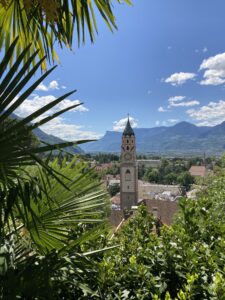
Meran
© Felicitas Weiß
The time spent with my roommates and my colleagues was also a highlight of my leisure
activities. We enjoyed the relaxed atmosphere of the aperitivo bars, went on great hikes, or even
paragliding together.
Overall, my leisure time during the internship was a perfect balance of active outdoor activities,
cultural explorations, and enjoyable camaraderie. The diverse opportunities the region offered
made this period an unforgettable and enriching experience during my time in the surgical
department.
5. Conclusion
In conclusion, my hospital internship in the surgery department was an incredibly enriching and
unforgettable experience. From the smooth preparation and comfortable accommodation to the
hands-on learning opportunities and supportive team, every aspect of the internship exceeded
my expectations. Additionally, exploring the beautiful landscapes, immersing myself in the
Italian language and culture, and forming lasting friendships with my colleagues made this
journey even more special. I am grateful for the knowledge and skills gained, and I will carry
the memories of this remarkable experience with me throughout my medical career.
Internship in Milan
- Governance of Technology and Innovation, MA
- Italy, Milan
- Politecnico di Milano
- 04/2023 – 06/2023
Application/Finding an internship
The search and application for the internship was relatively easy for me. Both RWTH Aachen University (RWTH) and Politecnico di Milano (PoliMi) are partners within the IDEA League network, which supports research stays at collaborating universities. The first prerequisite was to find a researcher who could supervise me during my stay. I had previously met my supervisor in person at an IDEA League Summer School. The fact that we already knew each other personally made it much easier for me to get in touch. He warmly welcomed the idea. It was more difficult when I subsequently contacted the host institution for my endeavor. At first, I received a rejection saying that PoliMi, the School of Design respectively, would not accept any interns or visiting scholars on a master’s level. After contacting the IDEA League representative of RWTH, who immediately got in touch with PoliMi, my research stay was eventually approved. First, I applied for the IDEA League Research Grant, but I got rejected. However, this didn’t affect the approval of my research stay. I was then advised to apply for funding through Erasmus+. I was pleasantly surprised by how quick and easy it was to apply for an Erasmus+ traineeship. In the end, my application was accepted, and I was thankfully awarded the Erasmus+ grant. Initially, I applied for two months, but I quickly realized that I would like to extend my stay by another month. This went smoothly and very uncomplicated. So, if plans change, even at short notice, it is possible to adjust them via Erasmus+. I would advise everyone to start very early with the application. I started 6 months in advance, but you underestimate how long an application process, in my case even two, can take.
Accomodation & Living Expenses
The search for suitable accommodation in Milan confronted me with great challenges. First, I searched for flats and shared apartments on popular websites like idealista. My relatively short stay of only a few months as well as my arrival in the middle of the semester made the apartment search even more difficult. After a long search, I found a shared flat via spotahome, a website for short and medium-term stays. I would only consider portals like spotahome or dovevivo if nothing else can be found, as bookings always come with additional fees and costs. The housing market in Milan is complicated. It is very difficult to find anything and certainly not at prices that are reasonable for students. There are reasons why numerous students are protesting these conditions by living in tents on campus. Therefore, it is not uncommon to share rooms in Italy. Although I was initially put off by the thought of almost completely giving up privacy, I ultimately decided to share a room as well. It was far less bad than I thought, but of course it depends a lot on who you get as roommates. And you usually don’t know that when you book a room through websites like spotahome. Not only the cost of housing, but also the cost of living is quite high in Milan, even by German standards. Milan is one of the most expensive cities in Italy and you should be aware of that. Not only restaurant visits, but even the cost of weekly grocery shopping is quite high. Usually, somewhat higher than in most major German cities. In retrospect, I am glad I saved on rent so I could at least live relatively comfortably without getting into financial trouble.
Everyday life/ the internship
I enjoyed the research stay very much. PoliMi is a prestigious institution, the facilities are remarkable, my research group called META was small but full of interesting and nice people who welcomed me warmly and supported me in all my needs. My workplace was on the Bovisa campus, just outside the city center. The campus is home to design students of all kinds. It is colorful, flashy, and bursting with creative people. It was a pleasure for me to come to the campus daily. As I came to PoliMi as a visiting scholar, the internship was not an internship in the traditional sense. As a visiting scholar, you are more independent and usually conduct your own research, but you are allowed to use the facilities and infrastructure on site, for example in the form of office spaces or the library. Since my master’s thesis is coming up, I was able to do a lot of research and collect data here. I also benefited from being able to collaborate and exchange ideas with researchers from similar fields. I assisted my colleagues by working together on projects and events. Hardly any day was like another, which made my stay even more varied and interesting.
Free time/tips
As far as everyday life is concerned, Milan has an incredible amount to offer. You can find everything your heart desires. Whether cultural institutions, sports, music events, restaurants, or festivals. Milan is a vibrant city. Moreover, Milan is very well connected within Italy. Therefore, it is easy to get pretty much everywhere from Milan. I took advantage of this and can highly recommend everyone to do the same. Italy is a beautiful country rich in culture and history. Additionally, Italy has hands down the best cuisine. There is certainly something for everyone.
The first tip is to get your Codice Fiscale early on. The Codice Fiscale is a tax identification number, but it is used for all kinds of contracts. Since I was not going to earn any money in Italy, I thought I would not need it. I was wrong though. I needed it for the rental contract and for a three-month card for public transport in Milan. The Codice Fiscale can be applied for at the Italian embassy in the state where you have your registered residence. The process may take several months. Another tip is to seek an exchange student status. I was offered the status as part of my application, but I declined because I did not think it was necessary. It was not mandatory, but the status would have given me access to the Erasmus student network, which would have allowed me to participate in numerous field trips, events, and parties. Obtaining exchange student status through the IDEA League is also relatively straightforward. If I had known this beforehand, it would have made it much easier for me to connect with exchange students. The third tip is to learn basic Italian. This becomes especially clear the further south you go in Italy. In the university context, English is not a problem at all, and it is also understood in many parts of Milan. In everyday life, however, it often comes in handy to have at least a rudimentary knowledge of Italian. Although Italians are warm and open to people from abroad, in my experience they are delighted if you at least try to speak the local language. My final tip is discounted tickets to cultural institutions. If you are an EU citizen and under the age of 25, you can get tickets at many cultural institutions at greatly reduced rates. Whether it’s the Last Supper in Milan, the Uffizi in Florence or the Museo die Capodimento in Naples. With an entrance fee of 2 euros, you don’t have to think twice about going to visit them.
Conclusion
All in all, I am very satisfied with my stay. It was different from what I expected, but I enjoyed it a lot. I met great people, was able to broaden my horizon and experience the Italian way of living. PoliMi is an excellent institution, and I was honored to spend a few months there. Moreover, Milan has much more to offer than just fashion. It is a vibrant big city with lots of possibilities. Looking back, I would do a few things differently. I would apply for an exchange student status and would start looking for housing earlier. In hindsight, however, one is always smarter. That is why I am happy to share my experiences so you can learn from my mistakes and get even more out of your stay in Milan. Nevertheless, I had a great time and would choose to stay at PoliMi anytime.
Writing a Master Thesis in Milan
- Management and Engineering in Technology, Innovation, Marketing and
Entrepreneurship M.Sc. - Italy, Milan
- Politecnico di Milano
- March – June 2022
I am happy to share some insights on my time abroad in Milan, Italy. During that time, I conducted research on my Master thesis at Politecnico di Milano. I am solely responsible for the content of this report.
Preparation
Prior to applying for the Erasmus+ Internship grant, there are several steps to be taken independently from the country or city you will be studying at. In my case, didn’t do an internship but wrote my Master thesis at a foreign university. Therefore, preparation included looking for interesting institutes or researchers across Europe, who have expertise in a specific field you are interested in writing a thesis in. A decent approach is to search for relating papers or studies, for example. After you have set eyes on a specific institute, I suggest writing a short research proposal. This includes 5-10 pages where you are explaining your motivation and your expertise regarding the specific research topic. Additionally, I suggest you write a short introduction to a possible topic that seems suitable as Bachelor/ Master thesis. Once you are in contact with respective researchers at the institute you applied for, you can start looking for an internal supervisor at RWTH. The overall topic of the thesis can then be “finetuned” between the three parties. From my expertise (I also wrote my Bachelor thesis externally), it shouldn’t be a big problem to find an internal supervisor as long as the external institution seems interesting! The actual application for the Erasmus grant is quite self-explanatory and convenient, so no need to further explain it in this report.
There is not much to consider before moving to Milan, as it quite easy to move around the European Union. However, when living in Italy you need to register for an Italian tax number. Just contact the Consulate of Italy in Cologne before the movement and they will send you a respective number.
Living in Milan
Everyone who has been to Italy before, knows exactly the Italian kind of vibe. And even though Milan is in the northern part of Italy, the so-called business part, you can truly feel this Italian spirit in Milan. Enjoy the food and all the Aperitivos you will have during your time abroad! Milan truly offers a lot of great restaurants, bars, and cafes. But don’t fall into the tourist trap and rely too heavily on websites like TripAdvisor and Co. Rather try out Pizzeria Assaje for an amazing pizza! Because by doing so, it can easily get quite expensive without the food actually being delicious. Thus, I suggest walking around the streets and absorbing the atmosphere. I am quite certain that you will quickly find a great place to eat. Especially, the district Citta Studi where the PoliMi is located offers great localities. But the great part about Milan is its great variety of districts that all offer other specialties. Navigli, for example, is famous for its many bars and the two canals that are filled with tourists during the day. In contrast, Porta Venezia is known as gay district and also offers great bars including a lot of clubs, whereas Moscova is rather a more expensive area where the wordl famous Duomo is also located. Other than that, almost every day you can find a lot of people gathering on public places. The infamous, Piazza Leonardo right in the center of PoliMi offers a great atmosphere with hundreds of students gathering every weekend and some DJs playing some music. Milan as the creative and fashion capital of Italy offers lots of intellectual places. Fondazione di Prada or Pinacoteca di Brera displays great art and amazing architecture. Many museums offer student discounts. Pinacoteca di Brera, for example, just costs 2€ per person.
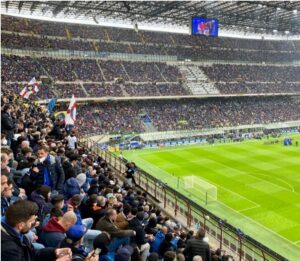
Picture from the stands of the San Siro stadium (Inter Milan vs AS Roma) © Jason Grüninger
Other than that, the San Siro stadium accommodates both Milanese teams AC Milan as well as Inter Milan. So, plenty of possibilities of embracing the incredible atmosphere in this stadium while watching first class football.
In summer, Italians are usually driving to the seaside themselves. You should do the same because Milan is quite empty in August! On a side note, as you are not included in any official welcome days by the host university, I suggest writing the RWTH authorities and asking them to share your contact details with the other moving students from RWTH. In this way, you already get to know some people before going abroad and can discuss common difficulties.
Accommodation/ Transport
For accommodation I recommend using Housing Anywhere. In Italy it is common that you don’t get to know your flat mates before you haven’t actually rent a room in the respective apartment. In my opinion that quite weird, but it is what it is. Just don’t be surprised! Another surprise can come with the prices for flats in the central districts. However, I suggest embracing the opportunity and really getting the most out of your time abroad by staying in the cool districts like Citta Studi, Porta Venezia, Washington, Moscova, Navigli. Otherwise, you might have to drive quite long distances, specifically because the metro stops working after 1pm and you have to use buses instead. Regarding the transportation, get yourself a monthly metro ticket. You just need a picture and then can file for the ticket at one of the ATM offices in the metro stations. The ticket costs 22€ per month and also allows you to take buses. Riding a bike in Milan is no fun because of cobblestones, bad streets, etc., so better use the public transport. Safety is not an issue in the public transport. Just be careful when taking the night buses, but no more caution is needed than anywhere else in big European cities.
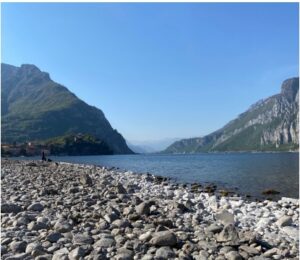
Lago di Como pictured in Lecco © Jason Grüninger
Around Milan
Milan is located in a great region. You are close to the mountains, as well as close to Lago di Como, Lago di Maggiore, and Lago di Garda. Enjoy some sun and take a dip at these destinations, it’s just an hour away from Milan by train!
Lecco, for example, is easy to reach and offers a cute little town at the stunning beginning of Lago di Como. I also went to Venice for two days, which is also quite close (3 hours by train).
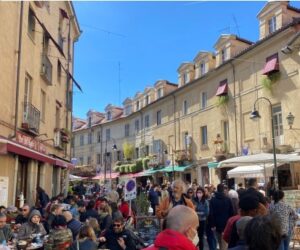
Busy street on a sunny day in Turin © Jason Grüninger
Additionally, Turin is close by and is definitely worth a visit! An absolutely underrated visit is the city of Bergamo. Especially the old town of Bergamo is beautiful and definitely worth a visit.
I hope this report gives you a good first impression of your time abroad.
I wish you a wonderful time in Milan!
My internship in the hospital Bolzano, Italy
- Medicine, Diploma
- Bolzano, Italy
- Hospital Bozen
- 15.11.2021 – 06.03.2022
In Germany the last year of medicine is a practical year, in which you can visit various subjects and hospitals to gain more practical experience. It is divided into three times four months stays each. For my first two month of this practical year, I chose the hospital Bolzano in South Tyrol, Italy. Since I knew this region already from previous holidays, I thought it would be a nice change after the big exam I had in October.
Application
The application process was very easy via email. You can find all information’s you need on the website of the hospital of Bolzano. Just keep in mind to do it one year ahead of the beginning of the internship. For all other organisational matters (contracts, insurance, etc) a staff member, responsible for us students, helped us continuously. She also supported us regarding application and apartment- hunting.
Apartment
Finding a flat was much more difficult than applying for the internship, as the housing market in Bolzano is very scarce and overpriced. Nevertheless, many students live here, and a solution can always be found. I can recommend to look in:
- Facebook groups ( Bolzano Unibacheca Universitari Affitti / Affitto Camera or Immobilienbörse Bozen Umgebung – Wohnungen PRIVAT (ver)mieten & (ver)kaufen)
- or the site: wg-gesucht.de
- and also on the university site: http://accommodationunibz.blogspot.com/.
I found a nice room in the city center in a shared flat with 5 people, which was really nice to connect immediately. Look for a room next to the city centre, since the outside areas are not that nice in general.
Transport
Bolzano is not very big, so you can easily explore the city by walking. However, the hospital was located a little outside town, so I decided to get a second hand bike. Bolzano is a very bike-friendly city. Dedicated bike lanes make it very pleasant to ride and you feel very safe. Some friends of mine preferred to go by bus and bought a Südtirol-Abo Plus card for 150 Euros, which you can also use as train ticket to Trient or cable cars of the mountains. To discover the surroundings of the city, a car is already an advantage, as you are usually much faster than by bus and can thus get to all the places. When we went skiing, we car-pooled and could go straight to the slopes with our skis in the car. It’s simply easier to move around with a car here. Unfortunately, Bolzano has no car sharing, but a bike sharing in the summer months.
Traineeship
My traineeship began in the middle of November 2021. In the Hospital we usually started at 7.30am with the morning reunion. We discussed the patients and the program for the day. After that we all went to have a coffee break together :D. During the day I was free to decide, whether I wanted to go into the surgery room or in the policlinic. The doctors were all extremely nice and polite. The working environment was very friendly and calm. We should at least stay for 6 hours to also get a free lunch, but it was also no problem if you had to leave earlier or could not come at a certain day. Lunch was rich of different options and there were always three courses—yuuummmy! After a while I definitely felt included in the team and could also relieve the doctors of work. It’s definetly an advantage to speak Italian as well as German. In South Tyrol they speak both German and Italian, but Bolzano is a little more Italian, therefore the working language in the hospital is also predominantly Italian. In the outlying areas of Bolzano people prefer to speak German. Most people however are bilingual, so you can easily get around.
Free time

© Chiara Löffler
After work there are a lot of options to spend your free time. The region here is very nice for outdoor activities. The mountains (Dolomites) are incredibly beautiful and in summer you can go hiking, climbing, biking etc and in winter it’s perfect for skiing or Snow hiking.
Since I was there in winter, I mostly went skiing. Obereggen, Seiser Almand Carezza are skiing areas that are approximately half an hour by car away from the city and have very nice slopes. You can also rent a sledge or just go hiking in the snow. You get a reduction on the skipass if you show your clinic employee card.
In March it got warmer and we were able to do some via ferrata and hikes in the surroundings (Eppan, Ritten, Jenesien). On the weekends we also did some city trips to Bologna, Venice, Milan, Verona and Lage Garda, which are all less than 2 hours by car. So, it is perfect to explore the North of Italy.
If you like to stay in town, you can drink coffee or have an Aperitivo (Aperol usually 3,5€) with friends. Expenses are quite cheap for drinking or eating and food here is really good. The weather is also amazing. Here some of my favourite food and drink stops: Bar Osteriada Picchio (book in advance), Al cantuccio (nice pizza), il Corso (nice pizza), Nussbaumer (perfect with parents), Exil Lounge (coffee place). Also I can recommend going to the cinema Film Club Bolzano, they often play movies in original language and the theatre Carambolage, who does most of their performances in German.
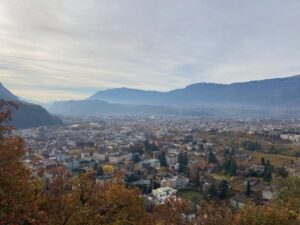
© Chiara Löffler

